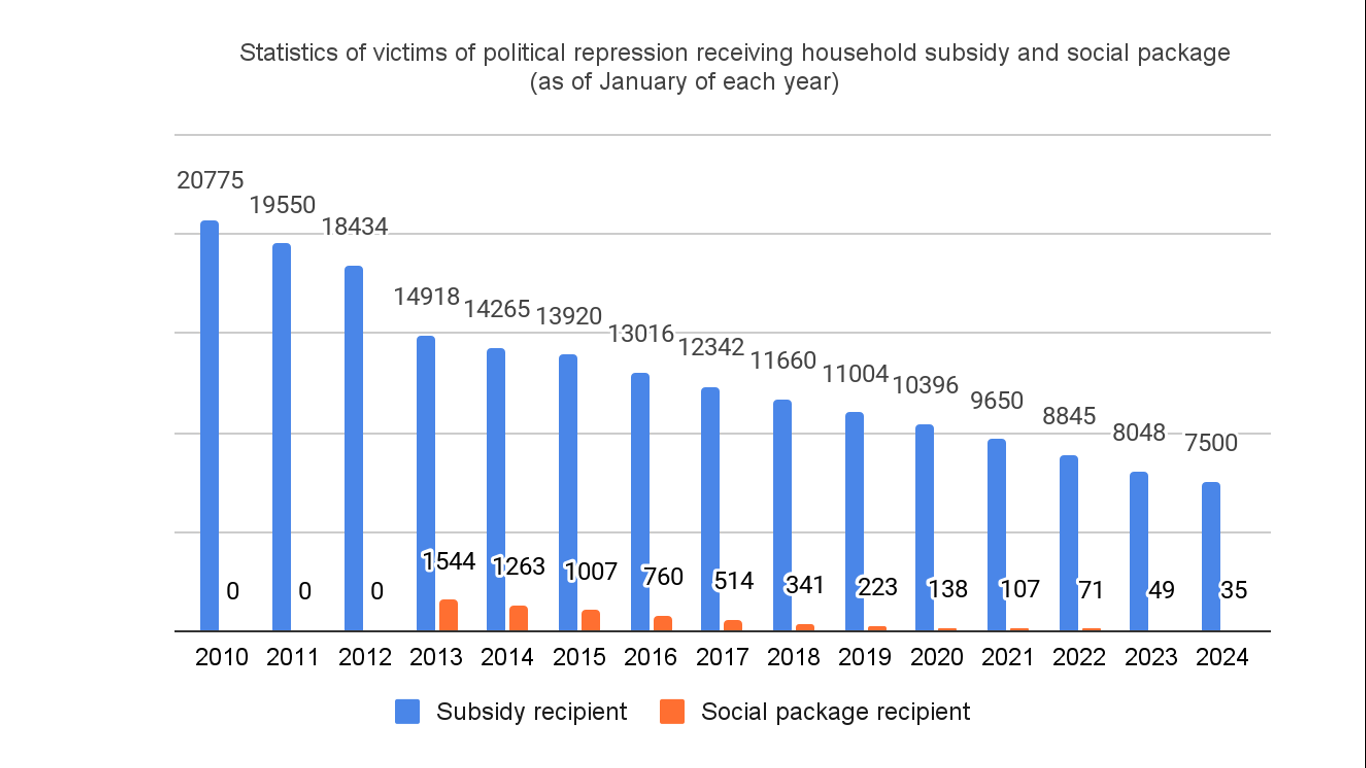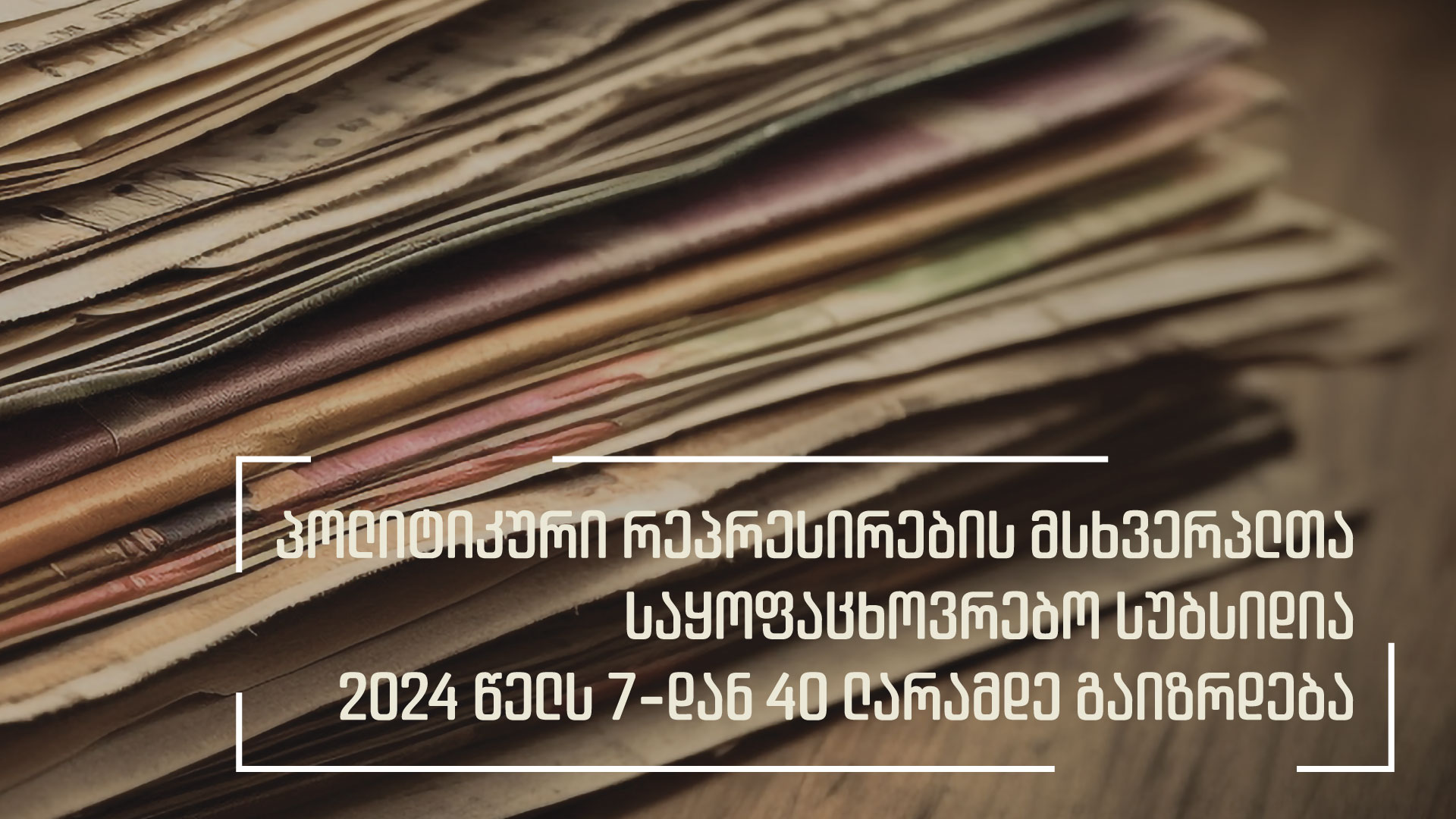According to the changes in the Draft 2024 State Budget of Georgia, the household subsidy for the victims of political repression will increase from 7 GEL to 40 GEL.
Regarding the possibility of taking into account the recommendations of the Finance and Budget Committee of the Parliament of Georgia with regard to the reworked version of the draft law of Georgia "On the 2024 State Budget of Georgia", we read:
One of the categories of recipients of social assistance are the persons recognized as victims of political repressions, the committee considers it advisable to increase the amount of the given allowance.
The largest part of the recipients of the 7 GEL household subsidy are family members of persons recognized as victims of political repressions, and the amount of subsidy for them increases from 7 GEL to 40 GEL.
It took several years of advocacy from the Society “Georgian Memorial” and IDFI to achieve the mentioned change…
Modern society fully recognizes that the practice of mass violations of human rights existed in the Soviet Union. After the collapse of the USSR, the states took upon themselves the obligation to restore the violated rights of citizens and their legal rehabilitation. Georgia has also taken this obligation, however, in recent years, the practice has shown that it was fulfilled only formally.
During the last years, IDFI and the society "Georgian Memorial" actively advocated for the increase of social assistance and household subsidies to the repressed persons and their descendants, since, for years, the household subsidy of the repressed persons was 7 GEL per month. The organizations launched a campaign to ensure that the government of Georgia increased the household subsidy of the repressed from 7 to 44 GEL (which at that time was provided to the participants of the Second World War, persons who became disabled as a result of the April 9 protest crackdown, and others) through the state budget. Within the framework of the campaign, IDFI and the society "Georgian Memorial" addressed the Prime Minister of Georgia three times in 2020: on June 24, July 27, and December 11.
The appeals were accompanied by two studies: Statistics of Social Assistance for the Victims of Political Repressions and Victims of Soviet Repressions in Georgia – Legal Remedies and Their Assessment, which detailed current statistics, international experience, and budget growth in the coming years if IDFI recommendations are taken into account. However, the appeals turned out to be fruitless - the organizations received the same answer - the subsidy increase was not considered.
On July 1, 2020, on the ichange.gov.ge portal, IDFI registered a petition requesting an increase in the household subsidy of the repressed. If 10,000 electronic signatures were collected within a month, the Georgian government was obliged to consider the issue described in the petition. The petition failed to gather the required number of votes, which was caused by procedural difficulties for interested persons to sign the electronic petition.
On June 30, 2021, IDFI and the Society "Georgian Memorial" once again appealed to the Prime Minister of Georgia, Irakli Gharibashvili, the Chairman of the Parliament of Georgia, Kakha Kuchava, the Minister of Finance of Georgia, Lasha Khutsishvili, and the Chairman of the Budget and Finance Committee of the Parliament of Georgia, Irakli Kovzanadze. The organizations received a response from the Ministry of Finance of Georgia on August 18, 2021: "Given the existing macro-fiscal parameters and the volume of social payments in the country, we do not consider it appropriate to further increase social payments."

Source: Social Services Agency
Note 1: The forecast figure for January 2024 is based on the current rate of decline of subsidy and social package recipients.
Note 2: The given statistics do not include the number of recipients of the social package in 2012, because it started from September 2012, therefore the statistics include data for only 4 months of 2012.
As mentioned, IDFI's appeals were supported by official statistics indicating a decrease in the number of the repressed individuals. Consequently, the financial resources spent by the state on the household subsidy of the repressed decreased every year. For example, as of January 2010, 20,775 victims of political repression benefited from a household subsidy of 7 lari, and their number decreased to 8,048 as of January 2023. In 2010, the state spent about 1.7 million GEL on household subsidies for victims of political repressions, and in 2022 - 700,000 GEL.
In January 2024, when the household subsidy will increase from 7 GEL to 40 GEL, the number of beneficiaries will be approximately 7,500 people, and the state will spend approximately 3.5 million GEL during the year.
A social package in the amount of 107 GEL is also provided for the victims of political repressions. The vast majority of repressed people cannot benefit from this package, because joint use of state pension and social package is not allowed. Considering that the state pension exceeds the social package, and the majority of the repressed are people who have reached retirement age, they prefer to use the state pension. Despite the fact that the rate of social package users has decreased significantly and the increase in the relevant assistance does not require a particularly large amount of financial resources from the state, there is no information about the increase of this social package in the 2024 budget draft.
In addition to the appeals, IDFI and the "Georgian Memorial" permanently talked about the mentioned issue through mass media: video clips and visual materials were made, and interviews were recorded with the descendants of the repressed, which ultimately contributed to raising awareness and creating a demand from the public.
In recent years, opposition MPs Teona Akubardia and Khatuna Samnidze have been actively raising the issue in the parliament. Teona Akubardia spoke more than once publicly about the mentioned problem and ways to solve it at committee meetings or sessions. In addition to the activity of the deputies, the descendants of the repressed often addressed the Parliament on the mentioned issue.
IDFI believes that the 40 GEL household subsidy is still disproportionate to the damage suffered by the repressed persons and their descendants and is not sufficient to meet the daily minimum financial needs of the citizens. However, this is still a small step forward to improve the conditions of up to 7,500 citizens receiving the subsidy.
The moral side of the issue is most important: the descendants of the repressed felt extremely humiliated by the amount of household subsidy (7 GEL per month!) that they received.
IDFI will continue to advocate for the improvement of the situation of the repressed, so that the measures taken by the government of Georgia and the decent appreciation of these people are as close as possible to the practices established in the EU, especially in the Baltic and Eastern European countries most affected by the Soviet Union.






